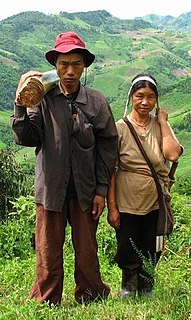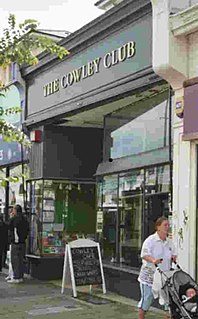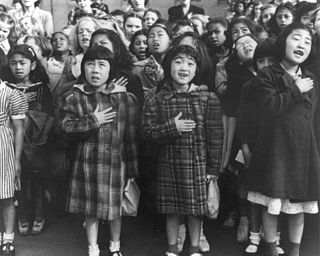
Myoglobin is an iron- and oxygen-binding protein found in the skeletal muscle tissue of vertebrates in general and in almost all mammals. Myoglobin is distantly related to hemoglobin. Compared to hemoglobin, myoglobin has a higher affinity for oxygen and does not have cooperative-binding with oxygen like hemoglobin does. But at the core, it is an oxygen-binding protein in red blood cells. In humans, myoglobin is only found in the bloodstream after muscle injury.

The epiglottis is a leaf-shaped flap in the throat that prevents food from entering the windpipe and the lungs. It stays open during breathing, allowing air into the larynx. During swallowing, it closes to prevent aspiration of food into the lungs, forcing the swallowed liquids or food to go along the esophagus toward the stomach instead. It is thus the valve that diverts passage to either the trachea or the esophagus.

Elsevier is a Netherlands-based publishing company specializing in scientific, technical, and medical content. It is a part of the RELX Group, known until 2015 as Reed Elsevier. Its products include journals such as The Lancet and Cell, the ScienceDirect collection of electronic journals, the Trends and Current Opinion series of journals, the online citation database Scopus, the SciVal tool for measuring research performance, the ClinicalKey search engine for clinicians, and the ClinicalPath evidence-based cancer care service. Elsevier's products and services also include digital tools for data management, instruction, research analytics and assessment.
RELX is a British multinational information and analytics company headquartered in London, England. Its businesses provide scientific, technical and medical information and analytics; legal information and analytics; decision-making tools; and organise exhibitions. It operates in 40 countries and serves customers in over 180 nations. It was previously known as Reed Elsevier, and came into being in 1992 as a result of the merger of Reed International, a British trade book and magazine publisher, and Elsevier, a Netherlands-based scientific publisher.

Humans are the most abundant and widespread species of primates, characterized by bipedality and large, complex brains enabling the development of advanced tools, culture and language. Humans are highly social beings and tend to live in complex social structures composed of many cooperating and competing groups, from families and kinship networks to political states. Social interactions between humans have established a wide variety of values, social norms, and rituals, which bolster human society. Curiosity and the human desire to understand and influence the environment and to explain and manipulate phenomena have motivated humanity's development of science, philosophy, mythology, religion, and other fields of knowledge.

Sir Nigel John Thrift, is a British academic and geographer. In 2018 he was appointed as Chair of the Committee on Radioactive Waste Management, a committee that gives independent scientific and technical advice on radioactive waste to the UK government and the devolved administrations. He is a Visiting Professor at the University of Oxford and Tsinghua University and an Emeritus Professor at the University of Bristol. In 2016 and 2017 he was the Executive Director of the Schwarzman Scholars, an international leadership program at Tsinghua University in Beijing. He was the Vice-Chancellor of the University of Warwick from 2006 to 2016. He is a leading academic in the fields of human geography and the social sciences.
Academic Press is an academic book publisher founded in 1941. It was acquired by Harcourt, Brace & World in 1969. Reed Elsevier bought Harcourt in 2000, and Academic Press is now an imprint of Elsevier.

Petrocaribe is an oil alliance involving 18 Caribbean member states. The alliance was founded on 29 June 2005 in Puerto La Cruz, Venezuela, Venezuela offering the other member states oil supplies based on a concessionary financial agreement. Petrocaribe has been part of the "pink tide" in Latin America seeking to achieve post-neoliberal development in the region. In 2013 Petrocaribe established links with the Bolivarian Alliance for the Americas (ALBA) aiming to go beyond oil trade and promoting economic cooperation.

The stratum spinosum is a layer of the epidermis found between the stratum granulosum and stratum basale. This layer is composed of polyhedral keratinocytes. These are joined together with desmosomes. Their spiny appearance is due to shrinking of the microfilaments between desmosomes that occurs when stained with H&E. Keratinization begins in the stratum spinosum, although the actual keratinocytes begin in the stratum basale. They have large pale-staining nuclei as they are active in synthesizing fibrilar proteins, known as cytokeratin, which build up within the cells aggregating together forming tonofibrils. The tonofibrils go on to form the desmosomes, which allow for strong connections to form between adjacent keratinocytes. The stratum spinosum also contains Langerhans cells.

Campaign Against Arms Trade (CAAT) is a UK-based campaigning organisation working towards the abolition of the international arms trade. It was founded in 1974 by a coalition of peace groups. It has been involved in several high-profile campaigns, including a legal challenge against the Serious Fraud Office's decision to suspend a corruption investigation into BAE Systems in 2007. On 27 September 2012, it was honoured with a Right Livelihood Award for its "innovative and effective campaigning".

Critical geography is theoretically informed geographical scholarship that promotes social justice, liberation, and leftist politics. Critical geography is also used as an umbrella term for Marxist, feminist, postmodern, poststructural, queer, left-wing, and activist geography.

New Zealand is an island country in the southwestern Pacific Ocean. It consists of two main landmasses—the North Island and the South Island —and more than 700 smaller islands, covering a total area of 268,021 square kilometres (103,500 sq mi). New Zealand is about 2,000 kilometres (1,200 mi) east of Australia across the Tasman Sea and 1,000 kilometres (600 mi) south of the islands of New Caledonia, Fiji, and Tonga. The country's varied topography and sharp mountain peaks, including the Southern Alps, owe much to tectonic uplift and volcanic eruptions. New Zealand's capital city is Wellington, and its most populous city is Auckland.
Friction of distance is a core principle of Geography that states that movement incurs some form of cost, in the form of physical effort, energy, time, and/or the expenditure of other resources, and that these costs are proportional to the distance traveled. This cost is thus a resistance against movement, analogous to the effect of friction against movement in classical mechanics. The subsequent preference for minimizing distance and its cost underlie a vast array of geographic patterns from economic agglomeration to wildlife migration, as well as many of the theories and techniques of spatial analysis, such as Tobler's first law of geography, network routing, and cost distance analysis. To a large degree, friction of distance is the primary reason why geography is relevant to many aspects of the world, although its importance has been decreasing with the development of transportation and communication technologies.

The Cowley Club is a libertarian self-managed social centre in Brighton, England. It opened in 2003, providing resources and meeting spaces for groups and individuals active in areas such as workplace and unemployed struggles, international solidarity, animal liberation, ecological defence, feminist and queer activism and opposing the arms trade. Its political identity is close to anarchism or libertarian socialism. It also houses a vegan community café, a bookshop, and free English lessons for migrants.

Banal nationalism refers to the everyday representations of the nation which build a shared sense of national belonging amongst humans, a sense of tribalism through national identity. The term is derived from English academic, Michael Billig's 1995 book of the same name and is intended to be understood critically. Billig's book has been described as 'the fourth most cited work on nationalism ever published'. Billig devised the concept of 'banal nationalism' to highlight the routine and often unnoticed ways that established nation-states are reproduced from day to day. The concept has been highly influential, particularly within the discipline of political geography, with continued academic interest since the book's publication in the 1995. Today the term is used primarily in academic discussion of identity formation, geopolitics, and the nature of nationalism in contemporary political culture.

Bilafond La (meaning "Pass of the Butterflies" in Balti language, also known as the Saltoro Pass, is a mountain pass situated on Saltoro Ridge, sitting immediately west of the vast Siachen Glacier, some 40 km directly north of map point NJ 980420 which defined the end of the 1972 Line of Control between Pakistan and India as part of the Simla Agreement. Bilafond La is on the ancient Silk Route linking the Indian Subcontinent and China.
Noel Castree FAcSS is a British geographer whose research has focused on capitalism-environment relationships and, more recently, on the role that various experts play in discourses about global environmental change. He is currently the editor-in-chief of the peer-reviewed journal Progress in Human Geography.
Jan E. Lovie-Kitchin is an Australian optometrist, former professor at Queensland University of Technology and founder of the university's Vision Rehabilitation Centre. She was the co-developer of the Bailey-Lovie visual acuity chart.
Jurgen Brauer is a German-American economist and contributor to the growing field of peace economics, the study of economic aspects of peace and security. He is Emeritus Professor of Economics at Augusta University, Augusta, GA,USA,and Visiting Professor of Economics at Chulalongkorn University, Bangkok, Thailand.

Climate security refers to the security risks induced, directly or indirectly, by changes in climate patterns. It is a concept that summons the idea that climate-related change amplifies existing risks in society that endangers the security of humans, ecosystems, economy, infrastructure and societies. Climate-related security risks have far-reaching implications for the way the world manages peace and security. Climate actions to adapt and mitigate impacts can also have a negative effect on human security if mishandled.














